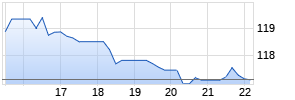
Choice Hotels International Reports Fourth Quarter And Full Year Results And 2018 Outlook
PR Newswire
ROCKVILLE, Md., Feb. 20, 2018
ROCKVILLE, Md., Feb. 20, 2018 /PRNewswire/ -- Choice Hotels International, Inc. (NYSE:CHH), one of the world's largest hotel companies, today reported its results for the three months and year ended December 31, 2017. Highlights include:
- Announced the acquisition of WoodSpring Suites, which added 239 hotels to the company's system in the first quarter of 2018.
- Full-year 2018 net income is projected to range between $190 million and $196 million; Adjusted earnings before income taxes, depreciation and amortization (EBITDA), excluding the application of the new revenue recognition standard and other items, is projected to range between $330 million and $341 million, a 14 percent increase at the midpoint of the range.
- Domestic unit growth, including the acquisition of WoodSpring Suites, for 2018 is expected to range between 7 percent and 8 percent.
- Total revenues for the three months ended December 31, 2017, increased 14 percent from the fourth quarter of the prior year.
- Income before income taxes was $46.7 million for the 2017 fourth quarter, a 7 percent increase from the 2016 fourth quarter.
- The impact of the tax legislation signed into law on December 22, 2017, and other items, resulted in a net loss of $6.4 million, or $0.11 per diluted share for the fourth quarter of 2017. Excluding the impact of these items, adjusted net income would have totaled $35.9 million compared to adjusted net income of $31.8 million for the 2016 fourth quarter, a 13 percent increase. See Exhibit 6 for calculation of adjusted results.
- Fourth quarter adjusted diluted earnings per share (EPS) was $0.63, a 13 percent increase from the 2016 fourth quarter. Full-year 2017 diluted EPS was $2.02 and adjusted diluted EPS was $2.88, a 14 percent increase from 2016.
- Adjusted EBITDA for the fourth quarter and full-year 2017 were $64.5 million and $295.0 million respectively, an increase of 15 percent from the adjusted EBITDA reported for the same periods of 2016.
- Repatriated approximately $200 million of foreign earnings in the first quarter of 2018.

"In 2017, Choice Hotels experienced another robust year of performance and exciting milestones, positioning us for future growth. This includes our best development year since 2007 with 704 executed franchise agreements. We recently added to our portfolio of brands with the acquisition of WoodSpring Suites, the fastest growing economy extended-stay brand," said Patrick Pacious, president and chief executive officer, Choice Hotels. "Choice remains focused on our franchisees' profitability and has further strengthened our value proposition, which is exemplified by continued increases in proprietary contribution and a 19-basis point increase in effective royalty rate."
Highlights of the company's hotel franchising business for the fourth quarter and full-year 2017 results are as follows:
Overall Results
- Total hotel franchising revenues for the fourth quarter increased 11 percent from the fourth quarter of the prior year.
- Hotel franchising selling, general and administrative costs (SG&A) totaled $46.0 million. Adjusted hotel franchising SG&A for the fourth quarter increased 21 percent, to $37.4 million, primarily due to increased variable sales compensation resulting from the highest level of franchise sales in the quarter and full-year since 2007, and the timing of our bi-annual international franchisee convention.
- Adjusted EBITDA from hotel franchising activities for the fourth quarter increased 7 percent from the fourth quarter of the prior year to $65.5 million. Adjusted EBITDA from hotel franchising activities for the full-year increased 9 percent from full-year 2016.
Royalties
- Domestic royalty fees for the fourth quarter totaled $74.2 million, an 8.5 percent increase from the fourth quarter of the prior year. Full-year domestic royalties increased 7.7 percent, to $323.9 million, from the same period of 2016.
- Domestic system-wide revenue per available room (RevPAR) increased 2.2 percent and 2.5 percent for the fourth quarter and full-year, respectively, compared to the same periods of the prior year. Average daily rates and occupancy rates increased 1.7 percent and 50 basis points for the full-year compared to the same period of 2016.
- Effective domestic royalty rate increased 19 basis points for both the fourth quarter and full-year 2017, compared to the same periods of 2016.
- The number of domestic franchised hotels, as of December 31, 2017, increased 2.6 percent from December 31, 2016.
- Added 346 new domestic hotels during 2017, opening nearly one hotel per day during the year.
- Domestic franchised rooms within the company's upscale brands, Cambria hotels & suites and Ascend Hotel Collection, increased by 28 percent to over 17,900 rooms at December 31, 2017.
Development
ARIVA.DE Börsen-Geflüster
Weiter aufwärts?
| Kurzfristig positionieren in Choice Hotels International | ||
|
ME5BAF
| Ask: 2,36 | Hebel: 5,67 |
| mit moderatem Hebel |
Zum Produkt
| |

Kurse
 |
- New executed domestic franchise agreements totaled 289 in the fourth quarter, bringing full-year new franchise agreements to 704 hotels, an increase of 8 percent and 9 percent compared to the fourth quarter of and full-year 2016, respectively.
- New construction domestic franchise agreements increased 17 percent and 23 percent in the fourth quarter and full-year 2017, respectively, from the comparable periods of 2016.
- The company executed 31 and 81 new domestic franchise agreements during the fourth quarter and full-year 2017, respectively, for its upscale brands, Cambria hotels and suites and the Ascend Hotel Collection. Fourth quarter and full-year 2017 executed agreements for upscale brands represent a 7 percent increase and a 31 percent increase from fourth quarter and full-year 2016, respectively, and the domestic pipeline for the company's upscale brands exceeded 135 hotels at December 31, 2017.
- Domestic relicensing and contract renewal transactions totaled 101 and 465 for the three months and year ended December 31, 2017, respectively. Relicensing revenues for full-year 2017 increased 15 percent over the prior year.
- The company's total domestic pipeline of hotels awaiting conversion, under construction or approved for development, as of December 31, 2017, increased 18 percent to 853 hotels from December 31, 2016.
- The new construction domestic pipeline totaled 607 hotels at December 31, 2017, a 23 percent increase from December 31, 2016.
Tax Reform
On December 22, 2017, "H.R. 1," known as the "Tax Cut and Jobs Act" ("Act"), was signed into law. The Act, among other changes, reduces the corporate income tax rate to 21%, creates a territorial tax system (with a one-time mandatory tax on previously deferred foreign earnings), allows for the immediate capital expensing of certain qualified property, and creates anti-base erosion rules that require companies to pay minimum taxes on foreign earnings. Although the Act is effective January 1, 2018, generally accepted accounting principles in the United States ("GAAP") require companies to account for the one-time transition tax on previously deferred foreign earnings and the effect of changes in income tax rates and laws on deferred tax balances in the period in which the legislation is enacted. As a result, the company recorded additional provisional income taxes from the mandatory tax on previously deferred foreign earnings, totaling approximately $35 million during the three months and year ended December 31, 2017. These taxes will be remitted over an eight-year period beginning in 2018. In addition, during the three months and year ended December 31, 2017, the company also recorded a provisional impairment of its deferred tax assets totaling approximately $5 million, reflecting the reduction of the corporate income tax rate from 35% to 21%.
Taking into account the change in the statutory federal rate as well as the Act's effects on state taxes and other permanent items, the company preliminarily expects its effective tax rate to be approximately 23% in 2018. This reduction in the tax rate represents an annual increase in cash flow of approximately $25 million, and the Act is expected to provide an additional available annual cash benefit of $25 million related to foreign earnings. In addition, the company repatriated approximately $200 million of foreign earnings in the first quarter of 2018 and expects to pay approximately $35 million of taxes over the next 8 years related to these previously deferred foreign earnings. With the financial flexibility that tax reform provides, the company anticipates continuing to make strategic investments in future areas of growth in its business and return excess cash flows, if any, to shareholders.
Use of Cash Flows
Dividends
During the year ended December 31, 2017, the company paid cash dividends totaling approximately $49 million. Based on the current quarterly dividend rate of $0.215 per common share, the company expects to pay dividends of approximately $49 million during 2018.
Share Repurchases
During the year ended December 31, 2017, the company repurchased approximately $10 million of common stock under its share repurchase program as well as repurchases from employees in connection with tax withholding and option exercises relating to awards under the company's equity incentive plans. The company currently has authorization to purchase up to 4.0 million additional shares under its share repurchase program.
Hotel Development & Financing
Pursuant to its program to encourage acceleration of the growth of the upscale Cambria hotels & suites brand, the company advanced approximately $87 million in support of the brand's development during the year ended December 31, 2017. The company also recycled approximately $31 million of prior investments in Cambria Hotels development projects, resulting in net advances of $56 million for the current year. Advances under this program are primarily in the form of joint venture investments, forgivable key money loans, senior mortgage loans, development loans, mezzanine lending, and through the operation of a land-banking program. On December 31, 2017, the company had approximately $251 million reflected in its consolidated balance sheet pursuant to these financial support activities. With respect to lending and joint venture investments, the company generally expects to recycle these loans and investments within a five-year period.
Revenue Recognition
Effective January 1, 2018, the company adopted the new revenue recognition standard ("ASC 606"), using the full retrospective approach. The adoption of ASC 606 will not change the cash flows or cash available for return to shareholders but will alter the timing of earnings recognition. In addition, the adoption of ASC 606 will also result in changes in classifications of certain items within the income statement. The adoption of ASC 606 will initially be reflected in the company's quarterly earnings reports as of and for the three months ending March 31, 2018, with adjustments also made to prior year comparable periods.
As a result of the adoption of ASC 606, initial and relicensing fees earned upon execution of a franchise agreement will be recognized as revenue ratably as services are provided over the enforceable period of the franchise license arrangement. This represents a change from current practice, whereby the company typically recognizes revenue for initial and relicensing fees in full in the period of agreement execution. Similarly, the company has determined sales commissions, which are paid upon the execution of a franchise agreement, will be recognized ratably over the period a hotel expected to remain in our franchise system rather than expensed as incurred.
Following the adoption of ASC 606, the amortization of the company's forgivable promissory notes will be reflected as contra-revenue rather than as a component of depreciation and amortization.
ASC 606 will also impact the company's accounting for surpluses and deficits generated from marketing and reservation system activities. The company has historically, consistent with its existing agreements, not earned a profit or generated a loss from marketing and reservation activities, and as a result, the company recorded excess marketing and reservation system revenues or expenses as assets or liabilities on the company's balance sheet prior to the adoption of ASC 606. However, subsequent to the adoption of ASC 606, the company will no longer defer revenues and expenses or record assets and liabilities when system revenues exceed expenses in the current period or vice versa. The Company intends to manage the system fund to break-even over time but anticipates net income or loss may be generated in years in which investments are needed for new initiatives that benefit our franchisees. Given the company's intentions with respect to marketing and reservation system activities and its obligations to franchisees, the company expects to exclude the financial impact of these programs from its adjusted financial metrics.
Outlook
To facilitate the review of the company's 2018 outlook, Exhibit 7 provides the company's 2018 forecasted results prior to the impact of the new revenue recognition accounting standards. Excluding the impact of the adoption of ASC 606, the company's adjusted EBITDA and adjusted EPS are forecasted to increase 14 percent and 26 percent, respectively at the midpoint of our estimated ranges.
The company's consolidated 2018 outlook reported below includes the forecasted results of the WoodSpring Suites acquisition from February 1, 2018, through December 31, 2018. In addition, the company's EBITDA and diluted EPS guidance have been prepared based on the impact of the new revenue recognition guidance, which became effective on January 1, 2018. The estimate of the allocation of the purchase price of WoodSpring Suites and the impact of ASC 606 on the company's results is preliminary and subject to change.
The adjusted numbers in the company's outlook exclude the impact of integration and acquisition related costs as well as the net surplus or deficit generated from the company's marketing and reservation system activities. See Exhibit 7 for the calculation of adjusted forecasted results and the reconciliation to the comparable GAAP measures.
Consolidated Outlook
- Net income for full-year 2018 is expected to range between $190 million and $196 million, or $3.31 to $3.42 per diluted share.
- Adjusted diluted EPS for full-year 2018 is expected to range between $3.54 and $3.66. The company expects full-year 2018 adjusted net income to range between $204 million and $210 million.
- Adjusted EBITDA for full-year 2018 is expected to range between $320 million and $331 million.
- The effective tax rate is expected to be approximately 23 percent for the first quarter and full-year 2018.
- The company's first quarter 2018 adjusted diluted EPS is expected to range between $0.58 and $0.61.
- Adjusted diluted EPS estimates are based on the current number of shares outstanding, and therefore do not reflect any subsequent changes that may occur due to new equity grants or further repurchases of common stock under the company's share repurchase program.
- The adjusted diluted EPS and consolidated adjusted EBITDA estimates assume that the company incurs net reductions in adjusted EBITDA related to non-hotel franchising activities at the midpoint of the range for these investments.
Hotel Franchising
- Adjusted EBITDA from hotel franchising activities for full-year 2018 is expected to range between $324 million and $335 million.
- Net domestic unit growth, excluding WoodSpring Suites, for 2018 is expected to range between approximately 2.5 percent and 3.5 percent.
- The acquisition of WoodSpring Suites added 239 hotels to the company's domestic portfolio, and an additional 15 hotels are expected to open in 2018.
- Domestic RevPAR, excluding WoodSpring Suites, is expected to increase between 1 percent and 3 percent for the first quarter and range between 1 percent and 3 percent for full-year 2018.
- The domestic effective royalty rate, excluding WoodSpring Suites, is expected to increase between 7 and 9 basis points for full-year 2018 as compared to full-year 2017.
Non-Hotel Franchising Activities
- Net reductions in full-year 2018 adjusted EBITDA relating to the company's non-hotel franchising operations are expected to range between approximately $3 million and $5 million.
Conference Call
Choice will conduct a conference call on Tuesday, February 20, 2018, at 10:00 a.m. ET to discuss the company's 2017 fourth quarter and year-end results. The dial-in number to listen to the call domestically is 1-855-638-5678, and the number for international participants is 1-920-663-6286. The conference call will be webcast simultaneously via the company's website, www.choicehotels.com. Interested investors and other parties wishing to access the call via the webcast should go to the website and click on the Investor Info link. The Investor page will feature a conference call microphone icon to access the call.
The call will be recorded and available for replay beginning at 1:00 p.m. ET on Tuesday, February 20, 2018, by calling 1-855-859-2056 (domestic) or 1-404-537-3406 (international) and entering access code 5278536. In addition, the call will be archived and available on choicehotels.com via the Investor Info link.
About Choice Hotels
Choice Hotels International, Inc. (NYSE: CHH) is one of the world's largest hotel companies. With over 6,800 hotels franchised in more than 40 countries and territories, Choice Hotels International represents more than 500,000 rooms around the globe and more than 1,000 hotels were in our development pipeline. Our company's Ascend Hotel Collection®, Cambria® Hotels, Comfort Inn®, Comfort Suites®, Sleep Inn®, Quality®, Clarion®, MainStay Suites®, Suburban Extended Stay Hotel®, WoodSpring Suites SM, Econo Lodge®, Rodeway Inn®, and Vacation Rentals by Choice HotelsTM brands provide a spectrum of lodging choices to meet guests' needs. With more than 35 million members, our Choice Privileges® rewards program enhances every trip a guest takes, with benefits ranging from every day rewards to exceptional experiences, starting right when they join. All hotels and vacation rentals are independently owned and operated. Visit us at www.choicehotels.com for more information.
Forward-Looking Statements
Certain matters discussed in this press release constitute forward-looking statements within the meaning of the Private Securities Litigation Reform Act of 1995. Generally, our use of words such as "expect," "estimate," "believe," "anticipate," "should," "will," "forecast," "plan," "project," "assume" or similar words of futurity identify such forward-looking statements. These forward-looking statements are based on management's current beliefs, assumptions and expectations regarding future events, which in turn are based on information currently available to management. Such statements may relate to projections of the company's revenue, earnings and other financial and operational measures, company debt levels, ability to repay outstanding indebtedness, payment of dividends, repurchases of common stock, future operations, and expected benefits from the Tax Cuts and Jobs Act, among other matters. We caution you not to place undue reliance on any such forward-looking statements. Forward-looking statements do not guarantee future performance and involve known and unknown risks, uncertainties and other factors.
Several factors could cause actual results, performance or achievements of the company to differ materially from those expressed in or contemplated by the forward-looking statements. Such risks include, but are not limited to, changes to general, domestic and foreign economic conditions; foreign currency fluctuations; operating risks common in the lodging and franchising industries; changes to the desirability of our brands as viewed by hotel operators and customers; changes to the terms or termination of our contracts with franchisees; our ability to keep pace with improvements in technology utilized for marketing and reservations systems and other operating systems; our ability to grow our franchise system; exposure to risks related to our hotel development and financing activities; fluctuations in the supply and demand for hotels rooms; our ability to realize anticipated benefits from acquired businesses; the level of acceptance of alternative growth strategies we may implement; operating risks associated with our international operations; the outcome of litigation; and our ability to manage our indebtedness. These and other risk factors are discussed in detail in the company's filings with the Securities and Exchange Commission including our annual report on Form 10-K for 2016 and our quarterly reports filed on Form 10-Q. Except as may be required by law, we undertake no obligation to publicly update or revise any forward-looking statement, whether as a result of new information, future events or otherwise.
Non-GAAP Financial Measurements
The company evaluates its operations utilizing the performance metrics of Adjusted EBITDA, hotel franchising revenues, adjusted hotel franchising SG&A, Adjusted EBITDA from hotel franchising activities, adjusted hotel franchising margins and adjusted diluted EPS, which are all non-GAAP financial measurements. These measures, which are reconciled to the comparable GAAP measures in Exhibit 6, should not be considered as an alternative to any measure of performance or liquidity as promulgated under or authorized by GAAP, such as net income, total revenues and operating margins. The company's calculation of these measurements may be different from the calculations used by other companies and therefore comparability may be limited.
We discuss management's reasons for reporting these non-GAAP measures and how each non-GAAP measure is calculated below.
In addition to the specific adjustments noted below with respect to each measure, the non-GAAP measures presented herein exclude acquisition related transition and transaction costs, executive termination benefits, impairment of below market lease intangibles recorded in SG&A costs, estimated one-time transition taxes related to tax legislation enacted into law on December 22, 2017 and acceleration of the company's executive succession plan in 2017 to allow for period-over-period comparison of ongoing core operations before the impact of these charges.
Adjusted Net Income and Adjusted Diluted Earnings Per Share: Adjusted net income and diluted EPS excludes the impact of acquisition related transition and transaction costs, executive termination benefits, impairment of below market lease acquisition intangibles, estimated one-time transition taxes related to tax legislation enacted into law on December 22, 2017 and the acceleration of the company's executive succession plan. We exclude these items because they occur infrequently and can vary considerably from period to period without reference to the company's operating performance. We consider adjusted net income and diluted EPS to be an indicator of operating performance because excluding these items allows for period-over period comparisons of our ongoing operations.
Adjusted Earnings Before Interest, Taxes, Depreciation and Amortization: Adjusted EBITDA reflects net income excluding the impact of interest expense, interest income, provision for income taxes, depreciation and amortization, other (gains) and losses, equity in net income of unconsolidated affiliates, mark to market adjustments on non-qualified retirement plan investments, acquisition related transition and transaction costs, executive termination benefits, impairment of below market lease acquisition intangibles and acceleration of the company's executive succession plan. We consider adjusted EBITDA to be an indicator of operating performance because we use it to measure our ability to service debt, fund capital expenditures, and expand our business. We also use adjusted EBITDA, as do analysts, lenders, investors and others, to evaluate companies because it excludes certain items that can vary widely across different industries or among companies within the same industry. For example, interest expense can be dependent on a company's capital structure, debt levels and credit ratings. Accordingly, the impact of interest expense on earnings can vary significantly among companies. The tax positions of companies can also vary because of their differing abilities to take advantage of tax benefits and because of the tax policies of the jurisdictions in which they operate. As a result, effective tax rates and provision for income taxes can vary considerably among companies. Adjusted EBITDA also excludes depreciation and amortization because companies utilize productive assets of different ages and use different methods of both acquiring and depreciating productive assets. These differences can result in considerable variability in the relative costs of productive assets and the depreciation and amortization expense among companies. Mark to market adjustments on non-qualified retirement plan investments recorded in SG&A are excluded from EBITDA as the company accounts for these investments in accordance with accounting for deferred compensation arrangements when investments are held in a rabbi trust and invested. Changes in the fair value of the investments are recognized as both compensation expense in SG&A and other gains and losses. As a result, the changes in the fair value of the investments do not have a material impact on the company's net income. These amounts are excluded from EBITDA as they can vary widely across reporting periods based on the performance of the investments and are not an indicator of the operating performance of the company.
Hotel Franchising Revenues, Adjusted Hotel Franchising EBITDA, Adjusted Hotel Franchising SG&A and Margins: The company reports hotel franchising revenues, adjusted hotel franchising EBITDA, adjusted franchising hotel SG&A and margins which exclude marketing and reservation system revenues; the SkyTouch Technology division; vacation rental activities including operations that provide Software as a Service ("SaaS") technology solutions to vacation rental management companies; and revenue generated from the ownership of an office building that is leased to a third-party. These non-GAAP measures are a commonly used measure of performance in our industry and facilitate comparisons between the company and its competitors. Marketing and reservation system activities are excluded from these measures since the company is required by its franchise agreements to use the fees collected for marketing and reservation activities; as such, no income or loss to the company is generated. Cumulative marketing and reservation system fees not expended are recorded as a liability in the company's financial statements and are carried over to the next year and expended in accordance with the franchise agreements. Cumulative marketing and reservation expenditures in excess of fees collected for marketing and reservation activities are deferred and recorded as an asset in the company's financial statements and recovered in future periods. SkyTouch Technology is a division of the company that develops and markets cloud-based technology products, including inventory management, pricing and connectivity to third party channels, to hoteliers not under franchise agreements with the company. The operations for SkyTouch Technology and our vacation rental activities are excluded since they do not reflect the company's core franchising business but are adjacent, complementary lines of business.
© 2018 Choice Hotels International, Inc. All rights reserved.
| Choice Hotels International, Inc. and Subsidiaries | | | | | | | | | | | | | | | | Exhibit 1 | ||
| Consolidated Statements of Income | | | | | | | | | | | | | | | | | | |
| (Unaudited) | | | | | | | | | | | | | | | | | | |
| | | | | | | | | | | | | | | | | | | |
| | | | | | | | | | | | | | | | | | | |
| | | | | | | | | | | | | | | | | | | |
| | | Three Months Ended December 31, | | Year Ended December 31, | | | ||||||||||||
| | | | | | | Variance | | | | | | Variance | | | ||||
| | | 2017 | | 2016 | | $ | | % | | 2017 | | 2016 | | $ | | % | | |
| (In thousands, except per share amounts) | | | | | | | | | | | | | | | | | | |
| | | | | | | | | | | | | | | | | | | |
| REVENUES: | | | | | | | | | | | | | | | | | | |
| | | | | | | | | | | | | | | | | | | |
| Royalty fees | | $ 79,575 | | $ 73,379 | | $ 6,196 | | 8% | | $ 345,302 | | $ 320,547 | | $ 24,755 | | 8% | | |
| Initial franchise and relicensing fees | | 7,872 | | 6,807 | | 1,065 | | 16% | | 26,262 | | 23,953 | | 2,309 | | 10% | | |
| Procurement services | | 9,014 | | 7,507 | | 1,507 | | 20% | | 34,661 | | 31,226 | | 3,435 | | 11% | | |
| Marketing and reservation system | | 131,810 | | 113,523 | | 18,287 | | 16% | | 567,083 | | 525,716 Werbung Mehr Nachrichten zur Choice Hotels International Aktie kostenlos abonnieren
E-Mail-Adresse
Bitte überprüfe deine die E-Mail-Adresse.
Benachrichtigungen von ARIVA.DE (Mit der Bestellung akzeptierst du die Datenschutzhinweise) -1  Vielen Dank, dass du dich für unseren Newsletter angemeldet hast. Du erhältst in Kürze eine E-Mail mit einem Aktivierungslink. Hinweis: ARIVA.DE veröffentlicht in dieser Rubrik Analysen, Kolumnen und Nachrichten aus verschiedenen Quellen. Die ARIVA.DE AG ist nicht verantwortlich für Inhalte, die erkennbar von Dritten in den „News“-Bereich dieser Webseite eingestellt worden sind, und macht sich diese nicht zu Eigen. Diese Inhalte sind insbesondere durch eine entsprechende „von“-Kennzeichnung unterhalb der Artikelüberschrift und/oder durch den Link „Um den vollständigen Artikel zu lesen, klicken Sie bitte hier.“ erkennbar; verantwortlich für diese Inhalte ist allein der genannte Dritte. Andere Nutzer interessierten sich auch für folgende News | ||||||




